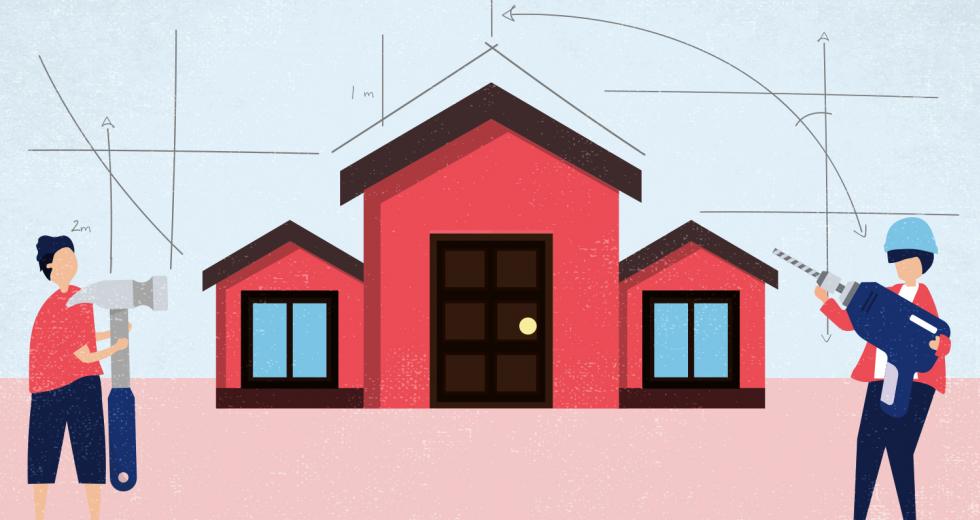You’re planning a home remodel project. You have a budget, contractor, lots of ideas and, of course, excitement. But are you really doing the improvements that will help you sell your home for the highest amount if that day eventually comes when you’re ready to move? Or are you going to become an example that real estate agents and appraisers give to talk about what not to do in real estate?
I know, you might be thinking, “You have some nerve to tell me what not to do to my house. This is a free country. I’ll do whatever I feel like.” I get it. It’s your home. All I’m saying is if you’re going to consider selling your house at some point, it’s wise to consider the rest of the market so you can maximize resale value.
Here are a few things you should not do.
DIY work: You don’t have to be a licensed contractor to fix up a home, but it’s easy to sniff out quality work versus something an owner did after a weekend of binging on HGTV. Often when walking through a house, I don’t even have to be told it was a do-it-yourself job — I can tell because the finishing details look a little off. Maybe some tiles are crooked, the electrical seems janky, the drywall isn’t quite smooth or the laminate floor doesn’t fit together perfectly.
Buyers tend to be picky about condition, so if the details of a project — even a small one — aren’t quite right, buyers may wonder what else is wrong with the house and decide not to make an offer.
The truth is despite a housing shortage throughout the Sacramento region, buyers tend to be picky about condition. If the details of a project — even a small one — aren’t quite right, buyers may wonder what else is wrong with the house and decide not to make an offer. If you have skills, use them. But if you’re not confident the work is going to resemble that of a licensed professional, then defer to skilled labor.
Fail to obtain permits: I understand why people don’t want to get permits: cost, time delays or the fear of a higher assessment with the county. But a lack of permits for bigger projects like adding square footage, a pool addition or garage conversion can sometimes become a problem when trying to sell or refinance, since some banks won’t lend on properties without permits. I’m not talking about small-ticket repair items that weren’t permitted, but big alterations to a house that required a permit.
Remember, getting a permit helps boost confidence among buyers that work was done correctly according to standards — not to mention, you avoid raising red flags during the loan process. Not sure if you even need a permit? Reach out to your local building department or ask a licensed contractor.
Become the biggest house: Bigger is always better, right? If you’re planning a remodel, be cautious not to become the largest house in the neighborhood beyond a reasonable margin. While it might give you bragging rights, when a home becomes too big, it tends to suffer loss in value because buyers simply don’t expect to find a house that large in the neighborhood. At some point, there is a price ceiling for a neighborhood too, meaning buyers will only pay so much before looking in a different location.
I recall a house in Sacramento that used to be close to 1,500 square feet until the owner added a whopper of an addition to create a 3,500-square-foot house. This McMansion stood out like a sore thumb, and despite the large size, it actually sold on par with other properties that were 1,500-2,000 square feet smaller. The moral of the story is: The market doesn’t always recognize a price premium for an abnormally large house in the wrong location.
Create functional confusion: If an addition or project is going to end up making the floor plan or layout awkward, you might want to rethink doing it. I’m talking about adding a bedroom to the rear of the house where you have to walk through another bedroom to get to it. Or building a second-story addition with two bedrooms — but not including a bathroom on that level. Basically, if buyers would say, What were they thinking? that’s not a good thing. You don’t want potential buyers to walk away feeling confused.
So, those are a few things not to do, but here are three closing tips to keep in mind during a remodel:
- Know your neighborhood: Be in tune with what your neighborhood expects, and don’t do anything more than the best house on the block has already done.
- Master the details: Be sure any remodeling has excellent finishing work, because it’s the details that create the first impression and can make or break the look of a project.
- Bounce ideas: If you’re planning on investing big money in your home, I highly recommend asking the real estate community what they think of the ideas. Talk to a real estate agent and appraiser to help you decide whether to pull the trigger or put on the brakes.
In all you do, enjoy your home. That’s the best advice I can give you. But if you can, make improvements that will help future buyers enjoy it, too.



